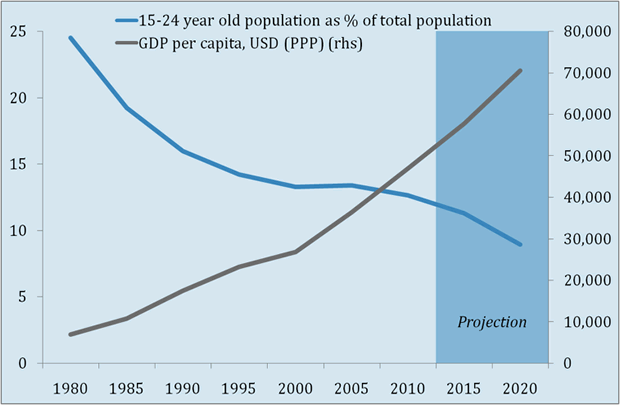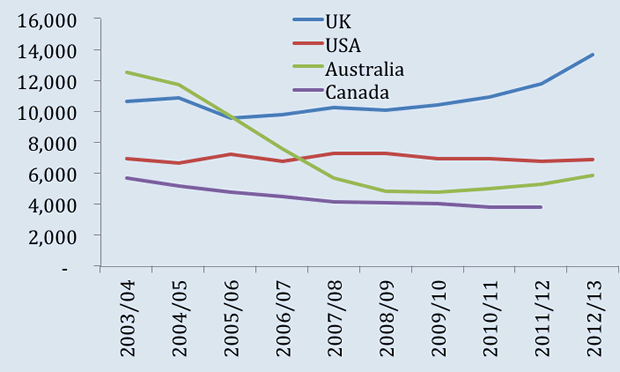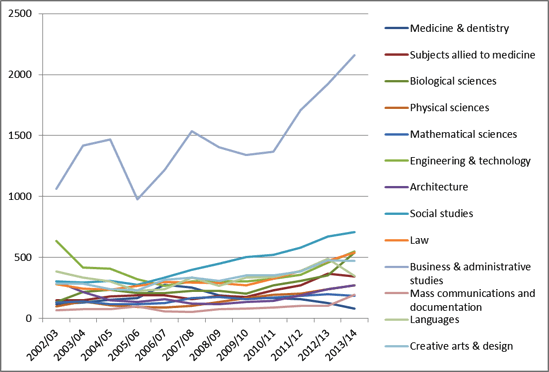Hong Kong has for many years been an ideal student recruitment market for UK institutions. With high living standards, an enthusiasm for English language education and close cultural ties to the UK, the former British colony sends both large numbers of its students abroad and a large share of these students to the UK. But with a recent uptick in social and political turmoil in Hong Kong, as well as a declining youth population, the future of UK education in this crucial student market looks far from certain.
Despite a total population of slightly more than 7m people, Hong Kong enrolled more first-year students in UK higher education institutions than all but five other non-EU countries in 2013/141, rising by seven per cent over the previous year. Hong Kong also enrolled more students in UK independent schools than any other country in the world in 20142, surpassing the total of Russia and Germany combined.
The exodus of students from Hong Kong to the UK is largely a function of a shortfall in higher education provision. In 2014, for example, almost 28,000 secondary school graduates who met university entrance criteria competed over 15,000 publicly funded places3.
Hong Kong has also emerged as one of the most important markets for transnational education (TNE) in the world, particularly for UK education. According to the Hong Kong Education Bureau, 72 per cent of non-local courses delivered in the former British colony in 2013 were provided by UK institutions4.
Amidst all of this strength, it may seem counterintuitive to suggest that Hong Kong’s student market is headed for rocky waters. This is doubly so given the relative strength of Hong Kong’s economy, which enjoys some of the highest per capita income levels in the world and which is projected to grow by more than three per cent per annum through 20205. On the surface, at least, Hong Kong’s demand for UK education will not be constrained by lack of purchasing power.
However, student-led political demonstrations erupted in 2014 around diminishing prospects for universal suffrage in the next election for Hong Kong’s chief executive, which is slated for 2017. The protests drew worldwide media attention and threatened to undermine Hong Kong’s status as a safe-haven for investment and global finance, not to mention international education. That the root cause of the protests was widespread dissatisfaction with a yawning income gap in Hong Kong, rather than political participation per se, suggests that the fruits of economic growth are not being shared equally.
Indeed, as Hong Kong has become richer, it has also become older. Hong Kong’s working age population is expected to drop this year for the first time since the 1950s6. What’s more, young people in Hong Kong now make up one of the smallest shares of the total population of any country in the world, and this is projected to fall further in the years ahead.
Hong Kong: Older and richer
Source: IMF, UN Department of Economic and Social Affairs
This downward demographic trend has immediate implications for the numbers of students progressing through Hong Kong’s education system, and hence the eligible pool of students to progress to tertiary programmes in the UK or enrol at TNE programmes locally. The overall number of secondary 6 graduates is expected to decline by some 9,000 students from 2014 to 2020, even as enrolments in Direct Subsidy Scheme schools (which have a mix of HKDSE and IB students) and international schools are forecast to increase slightly over this period.
Education Policy
The shortfall in publicly funded tertiary provision in Hong Kong has long been contentious, with widespread calls to increase access. The government has resisted such pressure, however, maintaining a steady number of 15,000 places for first year students at public HEIs while citing demographic trends as a primary reason for not increasing provision.
The greatest beneficiary of this reluctance to increase public provision of higher education has been the self-funded tertiary education sector, which comprises community colleges affiliated to universities and private HEIs. As the number of secondary graduates declines, however, this sector may face the most significant challenge, with research conducted by the British Council suggesting that local self-funded study is the third choice option for students behind publicly funded higher education or studying abroad (if the student has the required funds). With Hong Kong’s Education Bureau unlikely to increase funding support to this sector, some local providers may be forced to close their gates, with potential implications for TNE provision.
The most significant policy change in recent years has been the introduction of the Hong Kong Diploma for Secondary Education (HKDSE), which involved shortening primary and secondary education to a total of 12 years, and extending the length of standard undergraduate programmes from three years to four. The first cohort of HKDSE students graduated in 2012. Following this reform, the government has adopted a wait-and-see approach for at least five years. A mid-term review of the implementation of the HKDSE is due to be published in mid-2015, but according to education officials, recommendations will only include fine-tuning measures to the new system and no new significant reforms7.
The outbreak of student-led protests in 2014, however, showed that public pressure is building on Hong Kong’s government, with potentially far reaching implications for international education.
Social and Political Issues
When large scale democracy protests erupted in Hong Kong in September 2014, most attention was focused on demands from protestors for the right to directly elect Hong Kong’s next chief executive in 2017. Much less attention was paid to the other underlying causes of student frustration, namely rising inequality and perceived barriers to social mobility – manifested in relatively low graduate salaries and high property prices.
There is some truth to student complaints. Hong Kong’s housing affordability ranks worst among all major metropolises in the world, according to the Demographia International Housing Affordability Survey. Quality of life has also declined significantly in Hong Kong since 2007, according to an index compiled by the Chinese University of Hong Kong8, which includes 21 measures across social, economic and environmental fields.
This dissatisfaction with the current social and political structure of Hong Kong may also be contributing to a rising number of students who are choosing to enrol overseas. International education allows students to vote with their feet, and gives parents the peace of mind that their children are focusing more on their studies than their protests. Tellingly, local education agents reported an uptick in student enquiries after the outbreak of the Occupy Central protests.
With two full years until the next election, the possibility of further student unrest remains reasonably high over the coming years. This means that demand for international education should also remain high and continue to drive students to head overseas, possibly beginning at younger ages.
Student Mobility
Despite a shrinking youth population, the number of student enrolments from Hong Kong in UK higher education continues to grow. New enrolments in UK higher education rose nearly 16 per cent in 2012/13 and a further 7.8 per cent in 2013/14, with UCAS applications for the 2014 recruitment cycle six per cent higher than the year before.
The significant growth in 2012/13 could largely be explained by a double cohort of secondary school graduates in 2012 following the HKDSE reform. However, the strong growth in 2013/14 appears to be the result of continuing discontent with the local education system.
The U.K. is without a doubt the greatest beneficiary of the growth in recent years in outbound student mobility from Hong Kong. The U.K.’s market share of enrolments in English speaking host countries has increased markedly since 2010, while enrolments in the U.S., Australia and Canada have remained flat or even declined.9 This is believed to be due to a high degree of familiarity with the UK, with many parents of current students having studied in the U.K. themselves in the past, as well as affordability of Australia due to exchange rates.
Hong Kong enrolments in major English speaking study abroad destinations
Source: HESA, IIE, AEI, CIC
It is highly unlikely, however, that growth can continue at these rates over the next few years. Issuance of long-term (Tier-4) UK study visas to students in Hong Kong declined by 1.5 per cent in 2014 over the previous year, while the number of applicants whom had been sponsored by higher education institutions increased by 3.95 per cent over the same period, a reduced growth rate from previous years.
Meanwhile, enrolments of Hong Kong students in the UK school sector appear to have peaked, declining by 18 per cent in 2014, which followed a five per cent drop in 2013. This decline is believed to be due to a combination of factors: fewer civil service employees are utilising study abroad allowances, which have only been made available to civil servants who joined the service before August 1997, while of the growth of foundation programmes in Hong Kong has pulled some students away from studying A-Levels in the UK. Despite the declining trend of Hong Kong students studying in UK schools, however, Hong Kong is still the number two sending market in the world behind mainland China, and UK universities should view recruitment from UK boarding schools as one recruitment channel.
As a mature market, Hong Kong also presents UK institutions with an opportunity to recruit students for a wider range of subject areas. While Business & Administration remains the most popular subject area for Hong Kong students by a wide margin, enrolment has also grown in subject areas as diverse as Social Studies, Law, Engineering & Technology and Biological sciences.
First year enrolments in UK higher education, by subject
Source: HESA
The primary reason for the growth in these new subject areas appears to be concerns over graduate employability among Hong Kong students and their parents. Future demand appears particularly bright for subjects related to infrastructure and property development, such as architecture and engineering. Similarly, government efforts to diversify the economy should encourage growing numbers of students to study biological sciences and creative arts subjects.
Looking to the Future
While Hong Kong is a mature and relatively stable market for student recruitment, the next few years will likely see greater numbers of institutions – from a greater number of countries – competing to recruit a shrinking pool of students. Neither of these developments bodes well for the UK, although demand for UK education remains strong and UK institutions can take measures today to position themselves better for tomorrow.
As the seventh largest non-EU market for UK higher education enrolments globally, and the third largest market in East Asia10, Hong Kong’s student market is too large to be ignored by UK institutions. But as competition grows, institutions will need to appeal more to the concerns of Hong Kong students, particularly the need for high quality alternatives to Hong Kong’s local higher education system.
In order to communicate to potential students the benefits of UK qualifications, institutions promoting study in the UK (and likewise UK TNE courses in Hong Kong), will need to offer demonstrable benefits in terms of employment and career outcomes. This will require a combined effort among international offices, faculties, career and alumni offices. Institutions will need to go beyond advocating the benefits of their institutions, to supporting graduating students when they return to Hong Kong through internships, employment opportunities and alumni networks.
British Council’s Services for International Education Marketing (SIEM) team helps UK institutions refine their internationalisation strategies to succeed in East Asia and around the globe. Please get in touch if you would like to learn more.
Steven Corry
Regional Head of Business Development, SIEM East Asia
steven.corry@britishcouncil.org.hk
Anna Lee
Marketing Services Manager
anna.lee@britishcouncil.org.hk
Janice Ng
Marketing Services Manager
janice.ng@britishcouncil.org.hk
1 Higher Education Statistics Agency
2 Independent Schools Council Census 2014
3 Hong Kong Examinations and Assessment Authority
4 Hong Kong Education Bureau
5 IMF
6 Hong Kong Census and Statistics Department
7 Hong Kong Examinations and Assessment Authority
8 http://www.cuhk.edu.hk/hkiaps/qol/eventdoc/QoL%20report/QoL%202013%20report_eng.pdf
9 Higher Education Statistics Agency (HESA), Institute of International Education, Austrade
10 HESA 2013/14
